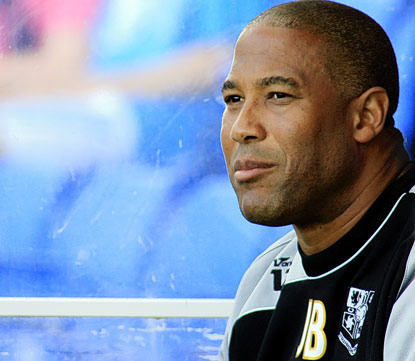July 06, 2010
Postcolonial melancholia and all that

At the risk of looking like I can only write about the World Cup at the moment - there are, I promise, a couple of big posts imminent on this site which will include new thoughts on space and hauntology - I want to reflect here on some of the recent discussions of football and politics thrown up by the World Cup and on Minus The Shooting. As for Minus The Shooting, I can only echo
Terry Eagleton's already infamous piece on the World Cup takes a surprisingly undialectical turn at the end. After a sensitive, even lyrical, evocation of football's artistry, its capacity to generate experiences of collectivity in "a social order denuded of ceremony and symbolism", Eagleton unexpectedly concludes that "the game has to be abolished." This is peremptory to say the least - and, since Eagleton makes the inevitable "opium of the people" comparison with religion, I'm tempted to offer a critique of Eagletion's critique of football in the spirit of the critique of the critique of relgion Alberto Toscano offers in his justly praised Fanaticism. To simplify his argument greatly, Alberto's claim is that the uniqueness of the mature Marx's position was that it treated religion as a symptom. Attacking religion directly would do nothing to affect the social and political conditions which allowed religion to function as a consolation and a distraction.
Some of the negative features about football that Eagleton identifies - the corporate takeover of the game, "Tory icon" Beckham - are contingent rather than necessary. Surprisingly, Eagleton mentions some of the more troubling aspects of the World Cup - the nationalism, for instance - only glancingly, and others - the increased incidence of domestic and other forms of violence associated with sporting events - not at all.

In fact, it's easy to imagine a World Cup without the trappings of consumer capitalism which, rather than being intrinsic to the tournament, perfectly fit Negri's description of Capital as parasitic upon the powers of the multitude. ITV HD's notorious blunder whereby they broadcast a Hyundai commercial over England's goal against the US unintentionally demonstrated the violence of this parasitism rather too clearly. The advertising and branding campaigns have felt for the most part, deeply tenuous and desperate; they have hung over the tournament like an irritating fog of semiotic pollution, and, like the punitively annoying, heavily repeated sponsor idents, they resemble exercises in the making of spurious connections, as if they were the result of some clever-clever competition in Nathan Barleyland (make a film linking Hyundai cars and the World Cup!) What does it mean, for example, that McDonalds is "the official restaraunt of the World Cup?" I can't help but be reminded of the Wing Commander's recent comments. "Fortunately, advertisements on the commercial channel strike the right tone. Children! Have a Mars bar! A burger! A Pepsi! The diet of future English World Cup winners." (Incidentally, speaking of the Wing Commander, it really is the case that Send Them Victorious is one of the funniest books about football ever written; it sounds fatuous to say it, but it's true, it's funny even if you don't much like football.)
Eagleton's most intriguinging remark - and one that I suspect may have been of particular interest to Giovanni - is his contrast of football's "vivid sense of tradition ... with the historical amnesia of postmodern culture, for which everything that happened up to 10 minutes ago is to be junked as antique." This characterisation of postmodern time only gives half the picture - the other side is the nostalgia mode attachment to the past, the formal repetition that hides beneath the hypberbright simulation of newness. Nevertheless, Eagleton's intuition that there is something important about the World Cup's marking of cultural time is correct. David Stubbs has argued that sport provides a unique kind of unscripted drama in collective life. Sport does not belong to the distributed time of Web 2.0, even if - as something like Twitter and indeed Minus The Shooting have shown - it can be greatly enhanced by certain aspects of Web 2.0. Like the X-Factor and Britain's Got Talent - which, in the spirit of Jameson's "Wal-Mart as Utopia" we need to learn from - the World Cup once again illustrates the continuing power of live television. Web 2.0's distributed time affines with the neoliberal notions of choice and bourgeois models of discriminating consumption (watching DVD box sets at our own pace), but these televised events involve a kind of voluntary subordination - in order to enjoy them adequately, we have to submit to them in real time. Yet this subordination is also a liberation, from digital twitch and constant partial attention and into new forms of digitally-enhanced collectivity, which are only just emerging. At the moment, it seems to be the case that such collective events cannot be demonstrated by the web alone, but the web has created a new ecology of participation around them.

John Barnes's rather suprising comments on the inherently socialistic nature of successful football sides contrasted with Eagleton's line:
- "Football is a socialist sport ... Financially, some may receive more rewards than others but, from a footballing perspective, for 90 minutes, regardless of whether you are Lionel Messi or the substitute right-back for Argentina, you are all working to the same end.
The teams which embrace the socialist ideology rather than having superstars, are the teams that are successful. Or if there are superstars they don't perceive themselves to be that. That's why I use Messi as an example. As much as he's a superstar he respects his team-mates and their collective efforts."
It would be great if Barnes's diagnosis - "Blame Thatcher", as the Spanish journalist Enric Gonzalez put it in a piece which very closely paralleled Barnes's argument - were correct. But England's worse performing period in the World Cup was actually in the pre-Thathcerite Seventies. England's failure to qualify for both the 74 and 78 tournament was another way in which the "lights went out" in the Seventies, and it deeply coloured my sense of what it meant to be English, giving me an early taste of what Paul Gilroy has called "postcolonial melancholia". I believe that, beyond the jouissance of defeatism that I've repeatedly talked about, England's long-term failure as a footballing nation has two main causes, both of which were hinted at it in Paul Myerscough's LRB blog post.

The first is institutional. The FA has gone from being a quasi-Feudalistic shambles to being a neoliberal shambles. Same English malaise, different systems. Once a crumbling repository of old English power (members of the Admiralty used to sit on committees), it is now the kind of business ontology-oriented body of which Adam Crozier was the CEO. (Crozier's dismal passage through English institutions like the FA and the Royal Mail tells its own story about life in neoliberal England.) Like English culture in general, the FA has passed from dithering cronyism to post-Fordist short-termism. Neither mode provides much appetite for planning or strategy. Reading Zone Styx's account of Germany's reconstruction after their 2001 defeat by England, one is astonished by the clear contrast with the situation in England. There is in English football no infrastructure capable of implementing a long-term strategy in the way that Germany has. Löw is not a lone aunt sally in the way that England managers are; he is the figurehead of an institutionally-defined strategy and one reason that Germany have had a consistent level of success in international football is institutional memory, something that England conspicuously lack (what they have instead is a kind of bad hauntology). The images of the returning England team folornly trudging through the non-places of defeat (car parks and unvisited airports) reminded me of similar images from 1982, and the same solutions that are being mooted now - a better youth system, a winter break - were being proposed then, when some of the senior members of the current England squad were barely born. They have even less prospect of beng implemented now than they did then, what with the power of the almighty Premiership.
The institutional problems go wider than the FA, though. As Paul Myerscough identifies, there is also the more informal anti-discourse network comprised of ex-players and the tabloid press, and their attitudes are shaped by what I think is the second key problem, the English hostitlity to abstraction. (Echoes again of Alberto's book, which argues that the poltiical pathologisation of fanaticism has usually equated it with a passion for abstraction.) This is far more deeply rooted in English culture than neoliberalism; indeed, it's the antipathy towards abstraction that made England so susceptible to neoliberal doctrines. If you want to see a buffoon empiricist, look at an English footballer. English culture's kneejerk individualism and what-you-see-is-what-you-get plain John Bull commonsense attitude makes for deep a suspicion of tactics and organisation. Much of the hostility towards Capello revolved around his not allowing someone like Gerrard to do what supposedly comes naturally to him - as if football ability were some instinctive force that can't be shaped or trained (well, I suppose Gerrard plays like that is the case). The Guardian reported earlier this month that only 2,769 English coaches hold Uefa's B, A and Pro badges; Spain has 23,995, Italy 29,420 and Germany 34,790. Meanwhile, David Beckham - a man with no coaching qualifications or experience - is in some quarters the favourite to be the next England manager.
Posted by mark at July 6, 2010 03:11 PM | TrackBack